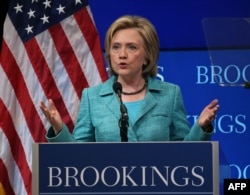Billionaire Donald Trump continues to gain support in his quest to be the Republican candidate in next year's U.S. presidential election.
In a new Washington Post-ABC News poll released Monday, 33 percent of Republican voters said they would choose Trump. That is up from 24 percent who said they would support him in July.
Former neurosurgeon Ben Carson surged to second place during that span, rising from 6 percent support in July to 20 percent in Monday's poll, which was conducted last week.
The rest of the crowded Republican field is struggling to keep pace as they get ready for their second debate on Wednesday night.
Former Florida Governor Jeb Bush came in at 8 percent in the poll, followed by Texas Senator Ted Cruz and Florida Senator Marco Rubio at 7 percent.
The poll shows a rough two months for the campaign of Wisconsin Governor Scott Walker, who ran second to Trump in July with 13 percent in that poll, but now would be the choice of just 2 percent of those surveyed.
Hillary slides
On the Democratic side, Hillary Clinton has seen her support fall, but still leads Vermont Senator Bernie Sanders by a margin of 56 to 28 percent. But with the potential candidacy of Vice President Joe Biden, who has not yet announced if he will run, Clinton could see an even greater challenge. With Biden as an option, only 42 percent of Democratic voters said they would choose Clinton, followed by 24 percent for Sanders and 21 percent for Biden.
About half of those surveyed said Clinton's use of personal email during her time as secretary of state broke government regulations and that they disapprove of how she is handling the issue. Still, 49 percent said it is not a legitimate issue in the election, while 44 percent said it is.
The poll indicates Clinton would be roughly even with Trump if the two faced off in the general election today.
When asked about Trump, 63 percent of respondents answered “no” when aksed whether he "has the right kind of personality and temperament it takes to serve effectively as president."
Trump anti-CEO?
On Sunday, Trump attacked the big salaries of corporate chief executives as "disgraceful."
Trump told CBS's Face the Nation, "You see these guys making these enormous amounts of money, and it's a total and complete joke."
In U.S. political campaigns, Democratic candidates often criticize the wide disparity between the pay of CEOs of big companies and their employees, which can be as much as 350 times greater. But Republicans, often thought to be the party of big business in the United States, rarely attack the salaries of corporate and Wall Street chieftains.
The 69-year-old Trump often brags about his wealth and business success building New York skyscrapers. But he laid the blame for high CEO pay on the executives themselves, who he said put their friends on corporate boards of directors, who in turn approve the big salaries for company leaders.
"It does bug me," Trump said. "It's very hard if you have a free enterprise system to do anything about that. You know, the boards of companies are supposed to [control spending and high pay executive pay], but I know companies very well and the CEO puts in all of his friends."
Trump has taken a populist, anti-Washington message to the top of the 16-candidate Republican field. He said in the coming weeks he would unveil proposals to cut individual and corporate taxes, "but for the hedge fund guys, they are going to be paying up."
Trump vs. 'the others'
Several of the Republican candidates have vowed in Wednesday's debate to attack Trump for his shifting views on U.S. health care, abortion and other issues over the years and make the argument that he is not in line with the views of the party's dominant conservative voters.
Republican Party chairman Reince Priebus told CNN's State of the Union on Sunday that "there will probably be more elbows thrown in that debate" than in the first one last month.
In an appearance on ABC's This Week, Carson dismissed Trump's recent remark that he did not have enough energy to be president.
"You don't have to be loud to be energetic," Carson said.
An earlier version of this report mistakenly gave Jeb Bush's approval rating at nine, instead of eight percent.






